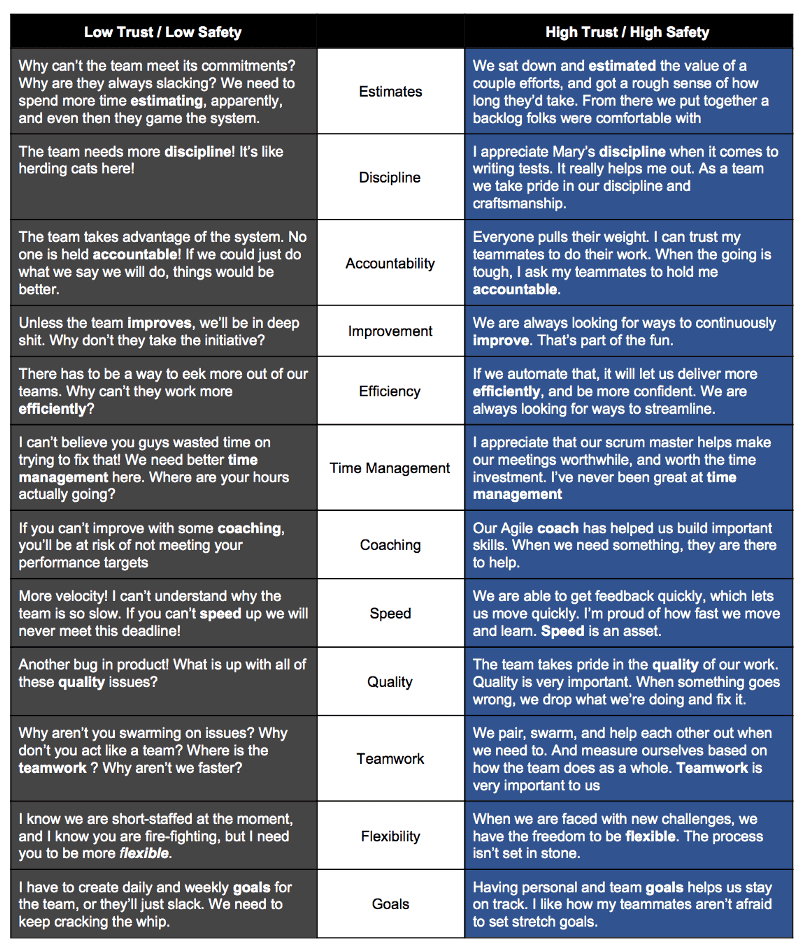 The other day I found myself fixating on the word discipline. An engineer friend and I were chatting about what made a great software developer. We agreed that discipline (along with dedication, skills, patience, etc.)
The other day I found myself fixating on the word discipline. An engineer friend and I were chatting about what made a great software developer. We agreed that discipline (along with dedication, skills, patience, etc.)
was a key ingredient.
However, I couldn’t shake a flashback from earlier in my career when an angry engineering director reamed his team for a lack of discipline (while simultaneously avoiding the fact that the team was getting peppered with distractions). Context is everything. Discipline can be something teams aspire to and take pride in. Or it can be an empty admonition.
The key differentiator is psychological safety (and by extension trust). Without safety, concepts like accountability, continuous improvement, and goals are difficult to discuss. Safety unlocks the ability for the team to reflect, take on difficult challenges, and have difficult discussions.
Below I look at words we throw around in product development through two different lenses:
- Low Trust / Low Safety (LTLS)
- High Trust / High Safety (HTHS) By looking at these side by side, I hope you’ll consider how you can create more psychological safety on your teams. It truly changes the game.
Estimates
LTLS: Why can’t the team meet its commitments? Why are they always slacking? We need to spend more time estimating, apparently, and even then they game the system. HTHS: We sat down and estimated the value of a couple efforts, and got a rough sense of how long they’d take. From there we put together a backlog folks were comfortable with#### Discipline
LTLS: The team needs more discipline! It’s like herding cats here! HTHS: I appreciate Mary’s discipline when it comes to writing tests. It really helps me out. As a team we take pride in our discipline and craftsmanship.#### Accountability
LTLS: The team takes advantage of the system. No one is held accountable! If we could just do what we say we will do, things would be better. HTHS: Everyone pulls their weight. I can trust my teammates to do their work. When the going is tough, I ask my teammates to hold me accountable.#### Improvement
LTLS: Unless the team improves, we’ll be in deep shit. Why don’t they take the initiative? HTHS: We are always looking for ways to continuously improve. That’s part of the fun.#### Efficiency
LTLS: There has to be a way to eek more out of our teams. Why can’t they work more efficiently? HTHS: If we automate that, it will let us deliver more efficiently, and be more confident. We are always looking for ways to streamline.#### Time Management
LTLS: I can’t believe you guys wasted time on trying to fix that! We need better time management here. Where are your hours actually going? HTHS: I appreciate that our scrum master helps make our meetings worthwhile, and worth the time investment. I’ve never been great at time management#### Coaching
LTLS: If you can’t improve with some coaching, you’ll be at risk of not meeting your performance targets HTHS: Our Agile coach has helped us build important skills. When we need something, they are there to help.#### Speed
LTLS: More velocity! I can’t understand why the team is so slow. If you can’t speed up we will never meet this deadline! HTHS: We are able to get feedback quickly, which lets us move quickly. I’m proud of how fast we move and learn. Speed is an asset.#### Quality
LTLS: Another bug in product! What is up with all of these quality issues? HTHS: The team takes pride in the quality of our work. Quality is very important. When something goes wrong, we drop what we’re doing and fix it.#### Teamwork
LTLS: Why aren’t you swarming on issues? Why don’t you act like a team? Where is the teamwork ? Why aren’t we faster? HTHS: We pair, swarm, and help each other out when we need to. And measure ourselves based on how the team does as a whole. Teamwork is very important to us#### Flexibility
LTLS: I know we are short-staffed at the moment, and I know you are fire-fighting, but I need you to be more *f*lexible. HTHS: When we are faced with new challenges, we have the freedom to be flexible. The process isn’t set in stone.#### Goals
HTHS: I have to create daily and weekly goals for the team, or they’ll just slack. We need to keep cracking the whip. LTLS: Having personal and team goals helps us stay on track. I like how my teammates aren’t afraid to set stretch goals.The angry engineering director I mentioned in the introduction was never able to establish psychological safety on his team. This made it impossible for the team to discuss things like time management, accountability, and goal setting in a positive light. The mere mention of a word like accountability — even between team members, outside of the manager’s earshot — set off the alarm bells, and the team justifiably shut down.
Meanwhile, my engineer friend I mentioned at the beginning of this story established a craftsmanship guild in his company, and the word discipline is elevated and discussed frequently.
I’ll leave you with a handy cheat-sheet that summarizes the HTHS vs. LTLS comparisons I made above. Stay safe out there.
